 With over 3.5 million lawsuits pending before courts across the country, the Supreme Court administration has undertaken new endeavours aiming to dispose of the backlog of cases.
With over 3.5 million lawsuits pending before courts across the country, the Supreme Court administration has undertaken new endeavours aiming to dispose of the backlog of cases.
Based on a new set of recommendations by Chief Justice Syed Mahmud Hossain, the court has initiated the process of cutting down the pile of cases from the first week of January 2019.
According to data obtained from the top court, more than 3.3 million cases were pending before courts across the country until 2017’s December and the number went over 3.5 million by the end of 2018's September. Among the 3.5 million 19,600 litigations are pending to be heard by the Supreme Court’s Appellate Division. Another 507,000 cases are pending before the High Court.
With more numbers adding to the backlog tally every day, the chief justice emphasised on disposing of cases from the very beginning of the New Year.
“The chief justice assigned 14 High Court benches to hear criminal cases, which are pending for a long time,” Supreme Court Special Officer Barrister Md Saifur Rahman told Bangla Tribune.
According to the top judge’s decision, the cause-lists for Thursday of the14 benches now feature pending cases.
“Under the initiative, the benches were initially assigned to dispose of 5,122 cases, among which almost 2,068 old cases have been disposed of in the eight days from Jan 2 to 9,” he said.
For the cases pending before the Appellate Division, Chief Justice Hossain has constituted two benches on Jan 3.
The bench led by the chief justice comprises of Justices Hasan Foez Siddique, Zinat Ara and Md Nuruzzaman.
The second bench will be led by Justice Muhammad Imman Ali. The other members are justices Mirza Hussain Haider and Abu Bakar Siddiquee.
The Supreme Court Administration is also keeping an eye on the lower courts to ensure that full working hours of the judges are utilised.
“Work hours of the lower court judges are being monitored to increase disposal rate of pending cases,” said Special Officer Rahman before adding, “Previously many judges didn’t hear cases in the afternoon. But now they are hearing more cases, effectively contributing to the disposal of more cases.”
Among other initiatives, the administration used the court’s fund to procure computers which were delivered to a number of courts across the country in January 2019.
“To help expedite the process of judicial tasks including writing verdicts, we have even sent a computer to a makeshift court in Kishoreganj’s Bajitpur,” said Rahman before adding, “We will fund more computers for the lower courts.”
All the courts will eventually get computers, he said.
Responding to a query on the possibility of appointing new justices in the Supreme Court, he said, “I have no knowledge on this matter.”
 Others
Others
30898 hour(s) 21 minute(s) ago ;
Morning 05:15 ; Friday ; Apr 26, 2024
Top court aims speedy disposal of backlog cases
Send
Bahauddin Imran
Published : 07:30, Jan 14, 2019 | Updated : 10:40, Jan 15, 2019
Published : 07:30, Jan 14, 2019 | Updated : 10:40, Jan 15, 2019
0 ...0 ...
/hm/zmi/
Topics: Top StoriesExclusive
- KOICA donates medical supplies to BSMMU
- 5 more flights to take back British nationals to London
- Covid19: Rajarbagh, Mohammadpur worst affected
- Momen joins UN solidarity song over COVID-19 combat
- Covid-19: OIC to hold special meeting
- WFP begins food distribution in Cox’s Bazar
- WFP begins food distribution in Cox’s Bazar
- 290 return home to Australia
- Third charter flight for US citizens to return home
- Dhaka proposes to postpone D8 Summit
Unauthorized use of news, image, information, etc published by Bangla Tribune is punishable by copyright law. Appropriate legal steps will be taken by the management against any person or body that infringes those laws.
Bangla Tribune is one of the most revered online newspapers in Bangladesh, due to its reputation of neutral coverage and incisive analysis.
F R Tower, 8/C Panthapath, Shukrabad, Dhaka-1207 | Phone: 58151324; 58151326, Fax: 58151329 | Mob: 01730794527, 01730794528


